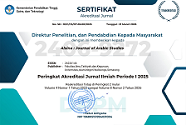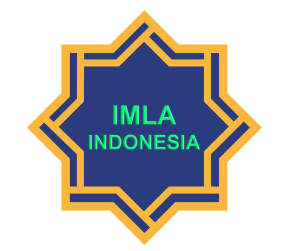Al-Ta'āzur bayna Taʿlīm Mahārat al-Qirā'ah ladá Ṭullāb Madrasah Bayt al-Hudá al-Ibtidā'īyah wa-Taʿlīm Qirā'ah wa-Kitābah al-Qur'ān al-Karīm
DOI:
https://doi.org/10.21580/alsina.4.1.10879Keywords:
Arabic language teaching, reading skills, Qur'anic reading and writing learningAbstract
One of Baitul Huda Madrasah Ibtidaiyah (elementary school) missions was to instill the habit of Qur'an reading. Thus, daily Qur'an reading activities were implemented in the school. Students who have not been able to read the Qur'an or are older than 12 years old must join the Qur'an reading - writing (BTQ) activity which uses Yanbua method. The purpose of this research is to characterize fifth-grade students' Arabic reading abilities acquired in conjunction with BTQ activities at Baitul Huda elementary school. It was expected that students who followed Yanbua method would improve their Arabic reading abilities, especially reading aloud skill. This research shows that Baitul Huda elementary school employed online and face-to-face Arabic learning methods since the COVID-19 epidemic. In addition, while the fifth graders have an excellent Arabic reading capacity, a few students read Arabic texts with a bit of stutter. Finally, the results of reading skills tests that correlate with BTQ learning indicated that 89.2 percent of students passed and 10.8 percent did not meet the minimal score, indicating that the proportion of BTQ learning positively affects students' Arabic reading ability.
Downloads
References
Ameri, Hayat, and Faride Asareh. “An Investigation about Language Learning Problems at Elementary Levels in Bilingual Areas of Iran.” Procedia - Social and Behavioral Sciences 9 (2010): 1757–61. https://doi.org/10.1016/J.SBSPRO.2010.12.395.
Aquami, Aquami. “Korelasi antara Kemampuan Membaca Al-Qur’an dengan Keterampilan Menulis Huruf Arab pada Mata Pelajaran Al-Qur’an Hadits di Madrasah Ibtidaiyah Quraniah 8 Palembang.” JIP (Jurnal Ilmiah PGMI) 3, no. 1 (2017): 77–88. https://doi.org/10.19109/JIP.V3I1.1379.
Arif, Muh., and Mukhtar I Miolo. “Faʿālīyat Taʿallum Al-Lughah Al-ʿArabīyah Bi-Istikhdām Al-Wasā’iṭ Al-Baṣarīyah Fī Al-Madrasah Al-ʿĀlīyah Al-Ḥukūmīyah Al-Mithālīyah Gorontalo.” `A Jamiy : Jurnal Bahasa Dan Sastra Arab 8, no. 2 (2019): 86–100. https://doi.org/10.31314/AJAMIY.8.2.86-100.2019.
Budiman, Ahmad Nasir. Ilmu Al-Qur’an: Pengenalan Dasar. Jakarta: Rajawali, 1988.
Darancik, Yasemin. “Students’ Views on Language Skills in Foreign Language Teaching.” International Education Studies 11, no. 7 (2018): 166–78. https://doi.org/10.5539/ies.v11n7p166.
Djulijanto, Harnen. “Strategi Pembelajaran BTQ Bagi Siswa MI Muhammadiyah Ajibarang Kulon Kecamatan Ajibarang.” STAIN Purwokerto, 2011.
Ghani, Salamiah Ab., Suhaila Zailani @ Hj. Ahmad, Ummu Hani Hj. Hashim, Zuraida Shaadon, and Nur Syazwina Mustapa. “Application of Basic Skills in Reading Arabic Text for Teaching and Learning Maharat Al-Qiraah.” Procedia - Social and Behavioral Sciences 59 (2012): 26–32. https://doi.org/10.1016/j.sbspro.2012.09.241.
Haidir, and Salim. Strategi Pembelajaran (Suatu Pendekatan Bagaimana Meningkatkan Kegiatan Belajar Siswa Secara Trasnformatif). Medan: Perdana Publishing, 2012.
Halimah, ‘Aqif. “Taʿlīm Mahārat Al-Qirā’ah Li-Al-Nāṭiqīn Bi-Ghayrihā.” LISANUNA: Jurnal Ilmu Bahasa Arab Dan Pembelajarannya 9, no. 2 (2019): 249–59. https://doi.org/10.22373/LS.V9I2.6744.
Haris, Abdul, MD. Qutbuddin, and Ahmad Fatoni. “Teachers’ Trends in Teaching Arabic in Elementary Schools.” Izdihar : Journal of Arabic Language Teaching, Linguistics, and Literature 4, no. 2 (2021): 195–210. https://doi.org/10.22219/JIZ.V4I2.16875.
Khoiriyah, Hidayatul. “Metode Qirā’ah Dalam Pembelajaran Keterampilan Reseptif Berbahasa Arab Untuk Pendidikan Tingkat Menengah.” LISANUNA: Jurnal Ilmu Bahasa Arab Dan Pembelajarannya 10, no. 1 (2020): 32–44. https://doi.org/10.22373/ls.v10i1.7804.
Kusuma, Yuanda. “Model-Model Perkembangan Pembelajaran BTQ Di TPQ/TPA Di Indonesia.” J-PAI: Jurnal Pendidikan Agama Islam 5, no. 1 (2018): 46–58. https://doi.org/10.18860/JPAI.V5I1.6520.
Luthfi, Taufik, and Dede Rizal Munir. “Hubungan Mata Pelajaran Muatan Lokal Bahasa Arab terhadap Kemampuan Baca Tulis Al-Quran Pada Siswa Kelas IX (Sembilan) SMP Al-Ihsan.” Kalamuna: Jurnal Pendidikan Bahasa Arab dan Kebahasaaraban 2, no. 2 (2021): 172–85. https://doi.org/10.52593/KLM.02.2.05.
M, Niknik, and Kuntarto. Cermat Dalam Berbahasa Teliti Dalam Berpikir. 8th ed. Jakarta: Mitra Wacana Media, 2010.
Ma’Luf, Louis. Al-Munjid Fi Al-Lughah Wa Al-A’lam. Beirut: Dar al-Masyriq, 2007.
Moss, Connie M., and Susan Brookhart. Ahdāf Al-Taʿallum: Musāʿadat Al-Ṭullāb ʿalá Istihdāf Al-Fahm Fī Dars Al-Yaum. Translated by ʿAbdullah Zayd Al-Kaylānī. Riyadh: Maktab al-Tarbīyah al-ʿArabī li-Duwal al-Khalīj, 2014.
Ningrum, Ayu Puspita, Nur Aini Dewi, Isna Apriyanti, and Roswita Rahmadhani Tambunan. “Mengenal Pembelajaran Baca Tulis Alqur’an.” Ihya Al-Arabiyah: Jurnal Pendidikan Bahasa Dan Sastra Arab 6, no. 1 (2020): 51–56. http://jurnal.uinsu.ac.id/index.php/ihya/article/view/7727.
Nur Sofiana, Arina, Nur Hapsari, and Nurul Huda. “The Problems of Reading Arabic Text in Terms of Phonological Aspects (Case Study in Fifth Grade Students of SD Qurrota A’yun Babadan Bantul DIY Academic Year 2020/2021).” Al Mahāra: Jurnal Pendidikan Bahasa Arab 7, no. 1 (2021): 138–62. https://doi.org/10.14421/ALMAHARA.2021.071-08.
Puji Lestari, Dwi, Mustolah Maufur, and Awaludin Abdul Ghaffar. “Pengaruh Pembelajaran Baca Tulis Quran terhadap Kemampuan Membaca dan Menulis Teks Bahasa Arab.” Tatsqifiy: Jurnal Pendidikan Bahasa Arab 3, no. 1 (2022): 13–20. https://doi.org/10.30997/TJPBA.V3I1.4839.
Sumardi, Mulyanto. Pengajaran Bahasa Asing Sebuah Tinjauan Dari Segi Metodologi. Jakarta: Bulan Bintang, 1974.
Suprihatin, Endah, Zaim Elmubarok, and Hasan Busri. “Pengaruh Menghafal Al-Qur’an Juz 29 terhadap Penguasaan Kosakata dan Keterampilan Membaca Bahasa Arab Kelas X (Studi Kasus di MAPK Al-Irsyad Demak).” Lisanul Arab: Journal of Arabic Learning and Teaching 6, no. 1 (2017): 38–43. https://doi.org/10.15294/LA.V6I1.14393.
Tarigan, Henry Guntur. Teknik Pengajaran Keterampilan Berbahasa. Bandung: Angkasa, 1979.
Ṭuʿaymah, Rushdī Aḥmad, and Muḥammad al-Sayyid Mannāʿ. Tadrīs Al-ʿArabīyah Fī Al-Taʿlīm Al-ʿĀmm: Naẓarīyat Wa-Tajārub. Cairo: Dār al-Fikr al-ʿArabī, 2001.
Uno, Hamzah B. Perencanaan Pembelajaran. Jakarta: Bumi Aksara, 2009.
Downloads
Published
How to Cite
Issue
Section
License
Copyright
The copyright of the received article shall be assigned to the publisher of the journal. The intended copyright includes the right to publish the article in various forms (including reprints). The journal maintains the publishing rights to published articles. Authors are allowed to use their articles for any legal purposes deemed necessary without written permission from the journal, but with an acknowledgment to this journal of initial publication.
Licensing
In order for Alsina: Journal of Arabic Studies to publish and distribute research articles, the editors need publishing rights (transferred from author to publisher). This agreement relates to the transfer/publishing copyright license to Alsina: Journal of Arabic Studies but the authors still have significant rights to use and share their published articles.
Alsina: Journal of Arabic Studies supports the need for writers to share, disseminate and maximize the impact of their research and their rights on any database. As a journal article writer, you have the right to various uses of your articles, including that by the institution or company where you work. Copyright can be used without the need for special permission. Authors who publish articles in the Alsina: Journal of Arabic Studies have broad rights to use their work for teaching and scientific purposes without requesting permission, including:
- Use by the author for lectures, presentations, or conferences, with distribution of copies to participants;
- Distribution to colleagues for research use;
- Use in compilations of the author's subsequent work;
- inclusion in a thesis or dissertation;
- Reuse of sections or excerpts from articles in other works (with full acknowledgment of the final article);
- Preparation of derivative works (other than commercial purposes) (with full acknowledgment of the final article);
- Voluntary posting on open websites operated by authors’ or writers' agencies for scientific purposes
When submitting a manuscript, authors do so on the understanding that if accepted for publication, the copyright for publishing (publishing right) of the article shall be assigned/transferred to Alsina: Journal of Arabic Studies.
Authors whose articles are accepted for publication will receive confirmation via email and sent a Copyright Transfer Agreement.


 Accreditation
Accreditation 
 In Collaboration with
In Collaboration with 

 Visitors
Visitors  Article Template
Article Template





